Vinylphosphonic acid
-
Product Name :
Vinylphosphonic acid
-
CAS No :
1746-03-8
-
Project State :
Commercial
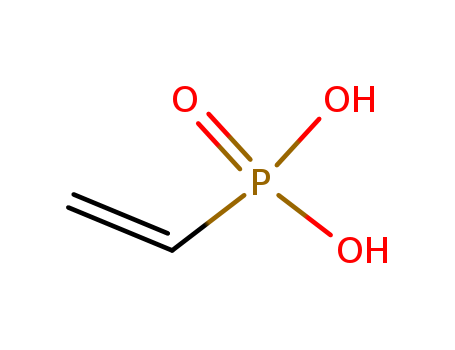
Application
General Description
Cost-effective and customizable Vinylphosphonic acid 1746-03-8 factory
- Molecular Formula:C2H5O3P
- Molecular Weight:108.034
- Vapor Pressure:0.00253mmHg at 25°C
- Melting Point:41-45 °C(lit.)
- Refractive Index:n20/D 1.473
- Boiling Point:266.2 °C at 760 mmHg
- PKA:2.11±0.10(Predicted)
- Flash Point:114.8 °C
- PSA:67.34000
- Density:1.425 g/cm3
- LogP:0.30760
Vinylphosphonic acid(Cas 1746-03-8) Usage
|
Flammability and Explosibility |
Notclassified |
|
Purification Methods |
This fireproofing agent, and ingredient for making polymers, is obtained as a syrup on hydrolyzing vinylphosphonyl dichloride with cold H2O and solidifies on prolonged drying over P2O5/KOH. When distilled at 235-240o/0.0006mm, it gives the anhydride (d 1.304, n 1.5874) [Kabachnik & Medvedi Izvest Akad Nauk SSSR, Ser Khim 868 1953, Chem Abstr 54 10834 1960]. It is best kept as the sodium salt (m 350o) which precipitates when a solution of EtOH containing NaOEt (from 2g of Na) is added to vinylphosphonic acid (3.2g), and is recrystallised from EtOH (5.1g, quantitative). The p-anisidinium salt forms mauve prisms m 250o (from EtOH/Et2O). The dimethyl ester, M 136.1, d4 1.1405, nD 1.4330, has b 72.5o/10mm and 197-202o/760mm. [Kabachnik et al. J Gen Chem USSR (Engl Trans) 33 375 1963, Beilstein 4 IV 3568.] |
|
General Description |
Vinylphosphonic acid (VPA) is an organophosphorus compound that is used in the surface treatment of metal substrates. It can be used in the preparation of poly(VPA) by radical polymerization in the presence of initiator systems and chain transfer agents. PVPA tends to have an electrolytic nature, which is useful for a variety of energy based applications. |
InChI:InChI=1/C2H5O3P/c1-2-6(3,4)5/h2H,1H2,(H2,3,4,5)/p-2
1746-03-8 Relevant articles
Microwave synthesis of vinylphosphonic acid and its derivatives
Zotov,Tuzhikov,Tuzhikov,Khokhlova
, p. 639 - 643 (2012)
Microwave Pyrolysis of β-substituted eth...
METHOD FOR PRODUCING PHOSPHONIC ACID DERIVATIVE
-
Paragraph 0051-0052, (2020/10/27)
PROBLEM TO BE SOLVED: To provide a metho...
Wet and dry processes for the selective transformation of phosphonates to phosphonic acids catalyzed by br?nsted acids
Li, Chunya,Saga, Yuta,Onozawa, Shun-Ya,Kobayashi, Shu,Sato, Kazuhiko,Fukaya, Norihisa,Han, Li-Biao
supporting information, p. 14411 - 14419 (2020/12/29)
A "wet"process and two "dry"processes fo...
Zwitterionic pyrrolidene-phosphonates: Inhibitors of the glycoside hydrolase-like phosphorylase: Streptomyces coelicolor GlgEI-V279S
Veleti, Sri Kumar,Petit, Cecile,Ronning, Donald R.,Sucheck, Steven J.
, p. 3884 - 3891 (2017/07/10)
We synthesized and evaluated new zwitter...
Joint production method of ethephon and vinylphosphonic acid
-
Paragraph 0015; 0016, (2018/02/04)
The invention discloses a joint producti...
1746-03-8 Process route
-

-
682-30-4
Diethyl vinylphosphonate

-
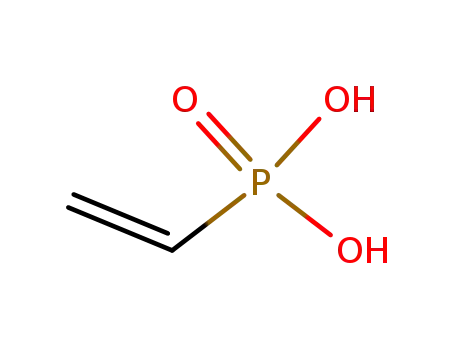
-
1746-03-8,27754-99-0
vinylphosphonic acid
| Conditions | Yield |
|---|---|
|
With
hydrogenchloride;
In
water;
at 80 ℃;
for 8h;
|
97% |
|
With
trifluorormethanesulfonic acid;
In
water;
at 140 ℃;
for 48h;
Sealed tube;
Schlenk technique;
|
76% |
|
With
trimethylsilyl bromide;
In
dichloromethane;
at 20 ℃;
for 9h;
|
-

-
7283-64-9
dibenzyl vinylphosphonate

-

-
1746-03-8,27754-99-0
vinylphosphonic acid
| Conditions | Yield |
|---|---|
|
With
trifluorormethanesulfonic acid;
In
benzene;
at 120 ℃;
for 24h;
Inert atmosphere;
|
100% |
|
With
trifluorormethanesulfonic acid;
In
toluene;
at 80 ℃;
for 8h;
Sealed tube;
Schlenk technique;
Inert atmosphere;
|
93% |
1746-03-8 Upstream products
-
1438-74-0

vinyldichlorophosphine oxide
-
18291-41-3
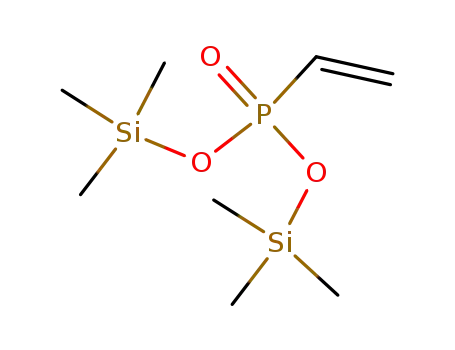
vinylphosphonic acid bis(trimethylsilyl) ester
-
16672-87-0
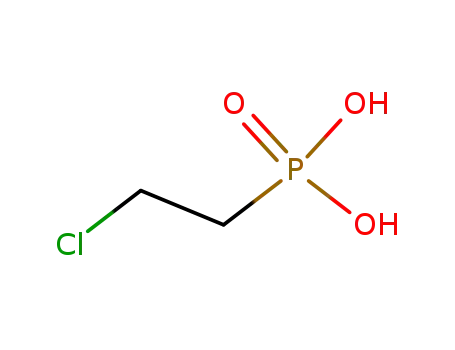
2-chloroethylphosphonic acid
-
53128-14-6
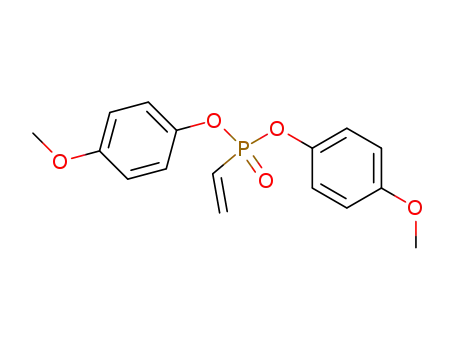
bis(4-methoxyphenyl) vinylphosphonate
1746-03-8 Downstream products
-
4645-32-3

dimethylvinylphosphonate
-
682-30-4

Diethyl vinylphosphonate
-
5962-42-5
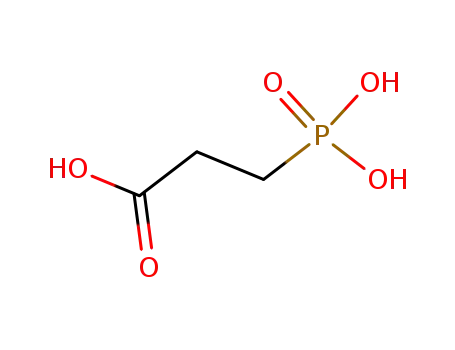
3-phosphonopropionic acid
-
1438-74-0

vinyldichlorophosphine oxide


